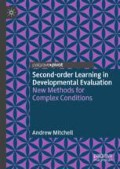Abstract
Projects deployed to respond to complex and wicked problems (e.g., sustainability and international development) are not well equipped to respond adaptively and innovatively to the significant challenges they face. While the developmental evaluation approach offers a welcome addition to the field of evaluation in that it supports project practitioners to optimise the use of their experiential learning, this approach has yet to articulate an epistemological framework that accounts for complexity or for learning under complex conditions. Drawing on empirical research and concepts from enactive cognitive science, Mitchell advances a framework for interacting orthogonally with practitioners to induce ruptures in the habituated patterns of observation to trigger fresh action options, and to participate actively in the generation of their own learning.
Access this chapter
Tax calculation will be finalised at checkout
Purchases are for personal use only
Notes
References
Bateson, G. (1972). Steps to an ecology of mind. New York: Ballantine Books.
Bateson, G. (1979). Mind and nature: A necessary unity. New York: Bantam.
Buchanan, B. (2008). Onto-ethologies: The animal environments of Uexküll, Heidegger, Merleau-Ponty, and Deleuze. Albany, NY: SUNY Press.
Burns, D., & Worsley, S. (2015). Navigating complexity in international development: Facilitating sustainable change at scale. Rugby: Practical Action Publishing.
Checkland, P., & Scholes, J. (1990). Soft systems methodology in action. Chichester, West Sussex: Wiley.
Deleuze, G. (1988). Spinoza: Practical philosophy (R. Hurley, Trans.). San Francisco, CA: City Lights Books.
Dunkley, R. A., & Franklin, A. (2017). Failing better: The stochastic art of evaluating community-led environmental action programs. Evaluation and Program Planning, 60, 112–122. https://doi.org/10.1016/j.evalprogplan.2016.11.005.
Foucault, M. (1980). In C. Gordon (Ed.), Power/Knowledge: Selected interviews and other writings (1972–1977). New York: The Harvester Press.
Frame, B., & Brown, J. (2008). Developing post-normal technologies for sustainability. Ecological Economics, 65, 225–241. https://doi.org/10.1016/j.ecolecon.2007.11.010.
Funtowicz, S., & Ravetz, J. (1993). Post-normal science. Futures, 25(7), 739–755. https://doi.org/10.1007/978-3-8350-9053-8_13.
Gunderson, L. H., & Holling, C. S. (Eds.). (2002). Panarchy: Understanding transformations in human and natural systems. Washington, DC: Island Press.
H.M. Treasury. (2011). The Magenta Book: Guidance for evaluation. London: H.M. Treasury.
Hobson, K., Hamilton, J., & Mayne, R. (2014). Monitoring and evaluation in UK low-carbon community groups: Benefits, barriers and the politics of the local. Local Environment, 21(1), 124–136. https://doi.org/10.1080/13549839.2014.928814.
Hobson, K., Mayne, R., & Hamilton, J. (2016). Monitoring and evaluating eco-localisation: Lessons from UK low carbon community groups. Environment and Planning A, 48(7), 1393–1410. https://doi.org/10.1177/0308518X16640531.
Hoffmeyer, J. (2008). Biosemiotics: An examination into the signs of life and the life of signs. Chicago, IL: University of Scranton Press.
Jackson, M. C. (2001). Critical systems thinking and practice. European Journal of Operational Research, 128(2), 233–244. https://doi.org/10.1016/S0377-2217(00)00067-9.
Maturana, H. R. (1988). Reality: The search for objectivity or the quest for a compelling argument. The Irish Journal of Psychology, 9(1), 25–82.
Maturana, H. (2002). Autopoiesis, structural coupling and cognition: A history of these and other notions in the biology of cognition. Cybernetics & Human Knowing, 9(3–4), 5–34.
Maturana, H. R., & Varela, F. J. (1980). Autopoiesis and cognition: The realization of the living. Dordrecht: D. Reidel.
Maturana, H. R., & Varela, F. J. (1992). The tree of knowledge: The biological roots of human understanding. Revised. Boston: Shambhala.
McDonald, H. (2016). Developmental evaluation: A tool to support innovation. Evaluation Matters—He Take Tō Te Aromatawai, 2, 79–97. https://doi.org/10.18296/em.0012.
Midgley, G. (2000). Systemic intervention: Philosophy, methodology, and practice. New York: Kluwer Academic/Plenum Publishers.
Patton, M. Q. (2011). Developmental evaluation: Applying complexity concepts to enhance innovation and use. New York: The Guildford Press.
Ramalingam, B. (2013). Aid on the edge of chaos: Rethinking international development in a complex world. Oxford: Oxford University Press.
Rittel, H. W. J., & Weber, M. M. (1973). Dilemmas in a general theory of planning. Policy Sciences, 4(2), 155–169. https://doi.org/10.1007/BF01405730.
Robson, C. (2002). Real world research (2nd ed.). Oxford: Blackwell.
Spencer-Brown, G. (1973). Laws of form. New York: Bantam.
Spinoza, B. (1992). Ethics: Treatise on the emendation of the intellect (2nd ed., S. Shirley, Trans.). Indianapolis: Hackett.
Star, S. L., & Griesemer, J. R. (1989). Institutional ecology, ‘translations’ and boundary objects: Amateurs and professionals in Berkeley’s museum of vertebrate zoology, 1907–39. Social Studies of Science, 19(3), 387–420. https://doi.org/10.1177/030631289019003001.
Tognetti, S. S. (1999). Science in a double-bind: Gregory Bateson and the origins of post-normal science. Futures, 31(7), 689–703. https://doi.org/10.1016/S0016-3287(99)00027-0.
von Uexküll, J. (1982). The theory of meaning. Semiotica, 42(1), 25–82.
von Uexküll, J. (1992). A stroll through the worlds of animals and men: A picture book of invisible worlds. Semiotica, 89(4), 319–391.
Varela, F. J., Thompson, E., & Rosch, E. (1991). The embodied mind: Cognitive science and human experience. Cambridge, MA: MIT Press.
Author information
Authors and Affiliations
Corresponding author
Rights and permissions
Copyright information
© 2019 The Author(s)
About this chapter
Cite this chapter
Mitchell, A. (2019). Concluding Remarks. In: Second-order Learning in Developmental Evaluation. Palgrave Pivot, Cham. https://doi.org/10.1007/978-3-319-99371-3_5
Download citation
DOI: https://doi.org/10.1007/978-3-319-99371-3_5
Published:
Publisher Name: Palgrave Pivot, Cham
Print ISBN: 978-3-319-99370-6
Online ISBN: 978-3-319-99371-3
eBook Packages: Business and ManagementBusiness and Management (R0)

